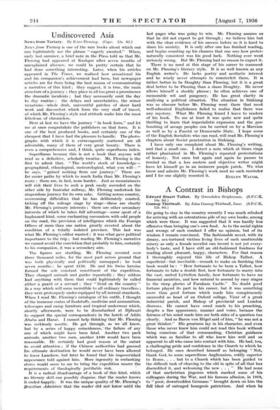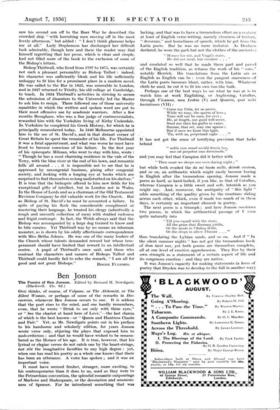A Contrast in Bishops
Connop Thirlwall. By John Connop Thiclwall, Junr. (S.P.C.K. 12s. 6d.)
ON going to stay in the country recently I was much rebuked for arriving with an ostentatious pile of my own books, among
which were these. It was suggested that it was hardly less offensive than bringing one's own food. As to the social rights
and wrongs of such conduct I offer no opinion, but of its wisdom I remain convinced. The fashionable novel, with its dreary, sex-tortured victims living lives of such unutterable misery as only a female novelist can invent is not yet every- body's taste, and I have still an old-fashioned fondness for reading about pleasant, happy, characters: For that reason I. thoroughly enjoyed this life of Bishop Talbot. A superficial—but inevitable—remark to make on finishing this"
book would be : " How fortunate to be born a Talbot, how fortunate to take a double first, how fortunate to marry into the vast, united Lyttelton family, how fortunate to have no financial anxieties, and how natural to ascend by easy stages to the steep glories of Farnham Castle." No doubt "good fortune played its part in his career, but it was something more than good fortune which made him conspicuously successful as head of an Oxford college, Vicar of a great industrial parish, and Bishop of provincial and London dioceses. He cannot have owed much to his preaching, despite a fine appearance, manner and voice, because the' fairness of his mind made him see both sides of a question too clearly. And as Baron von Hugel said of him, " he was not a great thinker." His greatness lay in his character, and even those who never knew him could not read this book without being conscious of that commanding, Christian guidance which was so familiar to all who knew him well and so apparent to all who came into contact with him. He had, too, a challenging pride and confidence in the Church to which he belonged. He once described himself as belonging " Not, • thank God, to some supercilious Anglicanism, coldly superior to Rome, . . . but to a Church which has been guided to the difficult task of cleaving to the old in spite of all that has
discredited it, and welcoming the new . . . " He had none Of that unchristian jingoism which marked some of his colleagues during the War, and his famous allusion, in 1919, to " poor, 'downtrodden Germans " brought down on him the Hill blait of outraged bourgeois patriotism. And when he
saw his second son off to the Boer War he described the crowded ship " with hurrahing men moving off in the most lovely afternoon," but added : " I don't think glamour helps me at all." Lady Stephenson has discharged her difficult task admirably, though here and there the reader may find himself regretting that her prose, which is clear and simple, had not filled more of the book to the exclusion of some of the Bishop's letters.
Bishop Thirlwall, who lived from 1797 to 1875, was certainly not such a pleasant personality as Bishop Talbot : indeed, his character was sufficiently bleak and his life sufficiently unhappy to fit him for a prominent place in a modern novel. He was called to the Bar in 1825, was miserable in London, and in 1827 returned to Trinity, his old college at Cambridge, to teach. In 1834 Thirlwall's activities in striving to secure the admission of dissenters to the University led the Master to ask him to resign. There followed one of those university squabbles in which the written and spoken word are put to their most offensive use by academic warriors. After a few months Brougham, who was a fine judge of controversialists, rewarded him with the Yorkshire living of Kirby Underdale. In Yorkshire he completed his Greek History, for which he is principally remembered today. In 1840 Melbourne appointed him to the see of St. David's, and in that distant corner of Great Britain he spent the remainder of his life. For Thirlwall it was a fatal appointment, and what was worse he must have lived to become conscious of his failure. In the first year of his episcopate Milman, who went to stay with him, wrote : " Though he has a most charming residence in the vale of the Towy, with the blue river at the end of his lawn, and romantic hills all around . . . it is impossible not to see that he is oppressed by uncongenial business, pining after congenial society, and looking with a longing eye at books which are surprised to fmd themselves so long undisturbed on his shelves." It is true that the bishopric offered to him new fields for his exceptional gifts of intellect, but in London not in Wales. In the House of Lords and as a chairman of the Old Testament Revision Company he did valuable work for the Church. But as Bishop of St. David's he must be accounted a failure. In spite of paying his flock the considerable compliment of mastering their language, he treated his clergy (admittedly a rough and uncouth collection of men) with studied rudeness and frigid contempt. In fact, the Welsh always said that the Bishop was accompanied by a large dog trained to know and to bite curates. Yet Thirlwall was by no means an inhumin monster, as is shown by his oddly affectionate correspondence with Miss Betha Johnes. He was one of the many leaders of the Church whose talents demanded reward but whose tem- perament should have limited that reward to an intellectual centre. A pupil of Thirlwall's once said, and those who contrast the characters and careers of Bishops Talbot and Thirlwall could hardly fail to echo the remark, " I am all for good and not great Bishops." ROGER FULFORD.







































 Previous page
Previous page